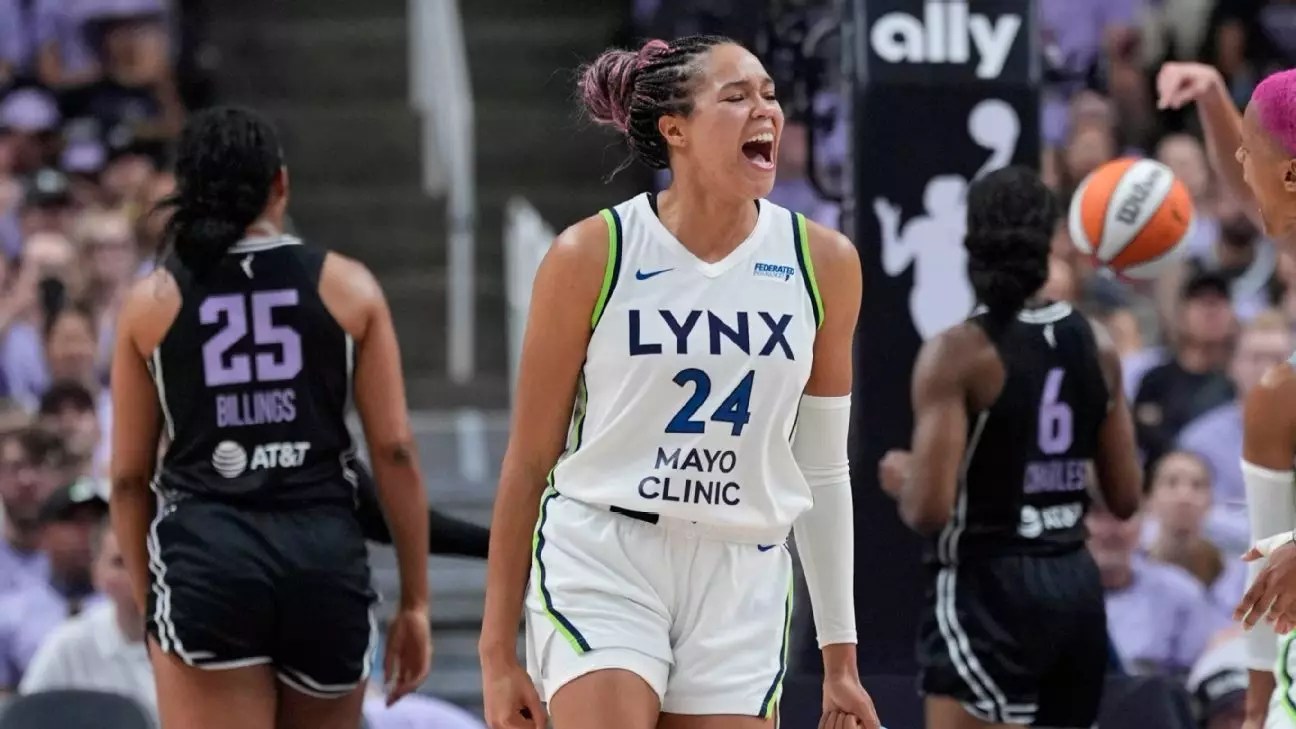In a landscape saturated with narratives of inevitability and predetermined outcomes, true champions are those who refuse to succumb to despair when circumstances seem insurmountable. The recent WNBA playoffs clash between Minnesota Lynx and Golden State Valkyries epitomizes this reality. Despite the Lynx’s daunting 14-point deficit entering the final quarter—a scenario statistically linked to a near-certain defeat—they ignited a comeback rooted not just in skill, but in gritty perseverance. This contest dismantles the overly simplistic belief that talent alone seals victory. Instead, it underscores how resilience can defy the odds, transforming desperation into a showcase of collective determination.
What this game reveals is the vulnerability embedded within competitive sports. Too often, observer narratives lean towards heroic narratives of dominance, overshadowing the crucial role of mental toughness and strategic adaptability. The Lynx’s remarkable rally demonstrates that victory is often cultivated in the moments when players embrace adversity rather than shy away from it. Their resurgence challenges the myth that once a team falls behind by a significant margin, recovery is improbable. It’s a powerful reminder that in the world of sports—and perhaps in life—the margin for failure is often narrower than perceived, and resilience is the critical trait that separates good teams from great ones.
The Politics of Motivation and Leadership in High-Stakes Moments
Cheryl Reeve’s leadership during this game exemplifies the vital importance of fostering unity and grit in the face of overwhelming pressure. Her message, succinct yet powerful, dispelled illusions of easy victories and instead emphasized that only effort and mental tenacity would lead to triumph. This speaks to a broader political philosophy rooted in liberal values: the belief that circumstances can be altered through collective effort, resilience, and leadership. The Lynx’s ability to rally isn’t merely about individual brilliance—it’s about a shared conviction that setbacks are nothing but opportunities for grit to emerge.
This perspective is often underappreciated in political discourse, where narratives of victimization can overshadow the agency necessary for change. The Lynx’s comeback underscores that perseverance, strategic adaptation, and unwavering resolve are fundamental not only in sports but also in democratic societies striving for progress amidst systemic challenges. It hints at a democratic belief that resilience is essential for overcoming entrenched inequalities and that leadership must inspire perseverance even when the odds appear stacked against us.
The Cultural Significance of Bouncing Back
On a broader cultural level, the Lynx’s victory fosters a narrative of hope and empowerment. Their comeback is emblematic of a society that values grit over entitlement, effort over privilege. In an era increasingly plagued by skepticism towards institutions and a sense of disillusionment, stories of resilience like this serve as vital anchors of optimism. They affirm that setbacks are temporary, driven more by internal fortitude than external fate.
Furthermore, this game exemplifies the importance of strategic adaptability—an ethos that can be applied to political movements seeking justice and reform. The Lynx’s intense fourth-quarter defense and precise offensive execution illustrate that success often depends on the ability to adjust tactics under pressure. This attitude resonates strongly within liberal visions of social reform: progress comes not solely from poetic ideals but from relentless, strategic efforts that adapt to changing circumstances. The game’s narrative invites society to see resilience not as a naive hope but as a deliberate, disciplined stance against despair.
The Role of Community and Shared Values in Triumph
The collective effort displayed by the Lynx reflects the profound importance of community in overcoming adversity. Each player’s contribution, from Collier’s clutch shooting to McBride’s important points, underscores the necessity of a shared vision and mutual trust. In a political realm dominated by polarization, this unity offers a compelling blueprint: progress is rooted in cohesion, respect, and the recognition that collective strength surpasses individual talent.
What’s notable is that the players’ demonstration of grit expands beyond personal achievement—it embodies a public good ethos. Their resilience communicates that enduring success requires more than fleeting individual moments; it demands sustained effort, solidarity, and the acknowledgment of all contributions. This lesson is particularly relevant for liberal centers that champion institutions built on collective responsibility, emphasizing that social progress depends on a resilient commitment to shared goals amid adversity.
The Unpredictable Nature of Victory and the Power of Hope
Ultimately, the Lynx’s narrow victory isn’t a mere statistical anomaly but a testament to the unpredictable, yet hopeful, spirit of sports competition—and by extension, the human condition. It demonstrates that even when the universe seems aligned against us, perseverance can tilt the scales. Such stories ignite the collective imagination, reinforcing the belief that change is always possible, even in moments that seem designed to quash hope.
In a political context, this underlines that societal transformation doesn’t depend solely on grand gestures but often on the small, persistent acts of resilience by individuals and communities. The Lynx’s revival signals an optimistic message: hope, fueled by persistent effort and unwavering unity, holds the power to rewrite the narrative. It’s a potent reminder that regardless of how bleak the outlook may appear, resilience can lead us to unexpected victories—and perhaps, to a more just and equitable future.

